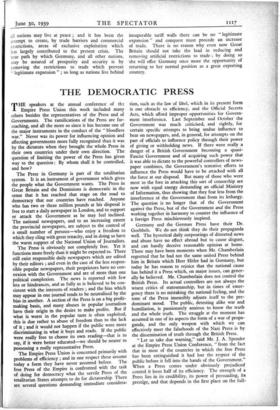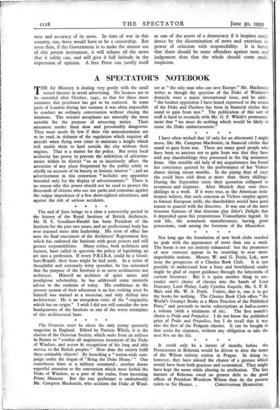THE DEMOCRATIC PRESS
T HE speakers at the annual conference of the Empire Press Union this week included many others besides the representatives of the Press and of Governments. The ramifications of the Press are far- reaching, and all the more so since it has become one of the major instruments in the conduct of the bloodless war." Never was its power for influencing opinion and affecting governments more fully recognised than it was by the dictators when they brought the whole Press in their own countries under their own direction. The question of limiting the power of the Press has given way to the question : By whom shall it be controlled, and how?
The Press in Germany is part of the totalitarian system. It is an instrument of government which gives the people what the Government wants. The Press in Great Britain and the Dominions is democratic in the sense that it has reached that stage on the road to democracy that our countries have reached. Anyone who has two or three million pounds at his disposal is free to start a daily newspaper in London, and to support or attack the Government as he may feel inclined. The national newspapers, and to an increasing extent the provincial newspapers, are subject to the control of a small number of persons—who enjoy a freedom to which they cling with great tenacity, and in doing so have the warm support of the National Union of Journalists.
The Press is obviously not completely free. Yet it functions more freely than it might be expected to. There still exist responsible daily newspapers which are edited by their editors ; and even in the case of the less respon- sible popular newspapers, their proprietors have no con- nexion with the Government and are of more than one political complexion. The news is reported with few lets or hindrances, and as fully as is believed to be con- sistent with the interests of readers ; and the bias which may appear in one journal tends to be neutralised by the bias in another. A section of the Press is on a big profit- making basis, and many abuses in popular journalism have their origin in the desire to make profits. But if what is worst in the popular taste is often exploited, this is due rather to abuse of freedom than to the lack of it ; and it would not happen if the public were more discriminating in what it buys and reads. If the public were really free to choose its own reading—that is to say, if it were better educated—we should be nearer to possessing a really representative Press. The Empire Press Union is concerned primarily with problems of efficiency ; and in one respect these assume today a form they have never assumed before. The free Press of the Empire is confronted with the task of doing for democracy what the servile Press of the totalitarian States attempts to do for dictatorship. There are several questions demanding immediate considera- tion, such as the law of libel, which in its present form is one obstacle to efficiency, and the Official Secrets Acts, which afford improper opportunities for Govern- ment interference. Last September and October the Government was much criticised, and rightly, for certain specific attempts to bring undue influence to bear on newspapers, and, in general, for attempts on the part of officials to influence policy through their power of giving or withholding news. If there were really a danger of a British Government becoming a quasi- Fascist Government and of acquiring such power that it was able to dictate to the powerful controllers of news- paper combines, the Government's tentative efforts to influence the Press would have to be attacked with all the force at our disposal. But many of those who were most to the fore in attacking this sort of censorship are now with equal energy demanding an official Ministry of Information, thus showing that they fear less from the interference of the Government than from its lethargy. The question is no longer that of the Government against the Press, but of the Government and the Press working together in harmony to counter the influence of a foreign Press mischievously inspired.
Germany and the German Press have their Dr. Goebbels. We do not think they do their propaganda well. The hysterical daily outpourings of distorted news and abuse have no effect abroad but to cause disgust, and can hardly deceive reasonable opinion at home. There may have been moments when Mr. Chamberlain regretted that he had not the same united Press behind him in Britain which Herr Hitler had in Germany, but today he has reason to rejoice that the national cause has behind it a Press which, on major issues, can gener- ally be believed. Mr. Chamberlain does not control the British Press. Its actual controllers are not always the wisest critics of statesmanship, but in times of emer- gency there is no mistaking the national feeling, and the tone of the Press insensibly adjusts itself to the pre- dominant mood. The public, detesting alike war and humiliation, is passionately anxious to know the truth and the whole truth. The struggle at the moment has assumed in one of its aspects the form of a war of propa- ganda, and the only weapon with which we can effectively meet the falsehoods of the Nazi Press is by the dissemination of truth through the British Press.
" Let us take due warning," said Mr. J. A. Spender at the Empire Press Union Conference, " from the fact that in most of the countries in which the free Press has been extinguished it had lost the respect of the public before it fell into the hands of the Government." When a Press comes under obviously prejudiced control it loses half of its efficiency. The strength of a Press lies in its credibility, its power of persuading, its prestige, and that depends in the first place on the full- ness and accuracy of its news. In time of war in this country, too, there would have to be a censorship. But even then, if the Government is to make the utmost use of this potent instrument, it will release all the news that it safely can, and will give it full latitude in the expression of opinion. A free Press can justify itself as one of the assets of a democracy if it inspires confi- dence by the dissemination of news and exercises its power of criticism with responsibility. It is better that there should be some offenders against taste and judgement than that the whole should come uncle, suspicion.











































 Previous page
Previous page